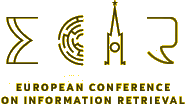The conference encourages the submission of high-quality research papers reporting original and innovative research in Information Retrieval. Submissions will be reviewed by experts on the basis of the originality of the work, the validity of the results, chosen methodology, writing quality and the overall contribution to the field of Information Retrieval.
ECIR has traditionally had a strong student focus, and papers whose sole or main author is a postgraduate student or postdoctoral researcher are especially welcome. Papers that demonstrate a high level of research adventure or which break out of the traditional IR paradigms are also particularly welcome.
All submissions must be written in English following LNCS author guidelines and submitted electronically through the conference submission system. Full papers must not exceed 12 pages including references and figures. Accepted papers will have to be presented at the conference. All submissions will be refereed. Papers will undergo double-blind peer review, so authors should take reasonable care not identify themselves in their submissions.
To submit a full paper and, preliminarily, its abstract, go to the ECIR 2013 submission web site:
http://www.conftool.pro/ecir2013/
Important dates:
- 1 Oct 2012: full paper abstract deadline
- 8 Oct 2012: full paper deadline
- 30 Nov 2012: notification of acceptance
All deadlines assume Hawaii time-zone.
Program Committee co-chairs:
- Jaap Kamps (University of Amsterdam, the Netherlands)
- Stefan Rueger (The Open University, UK)
Topics
The Program Chairs invite for the submission of original research papers in all areas of Information Retrieval, including but not limited to:
— IR Theory and Formal Models:- Searching, browsing, meta-searching, data fusion, filtering and indexing
- Text and content classification, categorisation, clustering
- Relevance feedback, query expansion
- Topic detection and tracking, novelty detection
- Content-based filtering, collaborative filtering, Spam filtering
- Personalised, collaborative or user-adaptive IR, recommender systems
- Adversarial IR
- Privacy in IR
- Mobile, Geo and Local Search
- Link analysis
- Query log analysis
- Advertising and ad targeting
- Spam detection
- Authority, Reputation, Ranking
- Blog and online-community search
- Social Tagging
- User modelling, user studies, user interaction in IR systems
- Interactive IR, User studies, User models, Task-based IR
- Novel user interfaces for IR systems
- User interfaces, visualisation and presentation of queries, search results or content
- Multimodal aspects
- Distributed and peer to peer IR
- Parallel IR
- Fusion/Combination
- Open, interoperable and flexible
- Performance, Scalability, Architectures, Efficiency, Platforms
- Compression, performance, optimisation
- IR for semi-structured documents
- IR for semantically annotated collections, semantic search
- Meta information and structures, metadata
- Query representation, Query reformulation
- Text Categorisation and clustering
- Text data mining
- Opinion mining
- Cross-language retrieval, Multilingual retrieval
- Machine translation for IR
- Question answering, Natural language processing for IR, Summarization
- Evaluation methods and metrics
- Building test collections and metrics
- Experimental design
- Crowdsourcing for evaluation
- User-oriented and user-centred test and evaluation
- Speech retrieval
- Image and video retrieval
- Digital music, radio and broadcast retrieval
- Digital libraries
- Enterprise Search, Intranet search, Desktop search
- Mobile IR
- Genomic IR, IR for chemical structures, etc.
- Medical IR, legal IR, patent search





